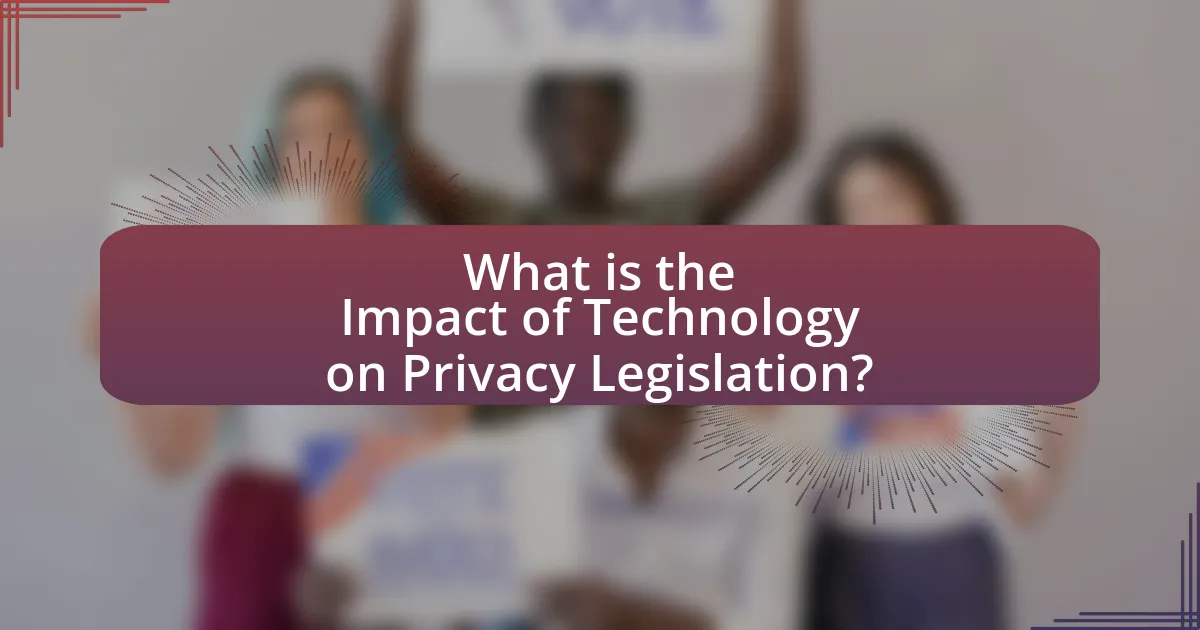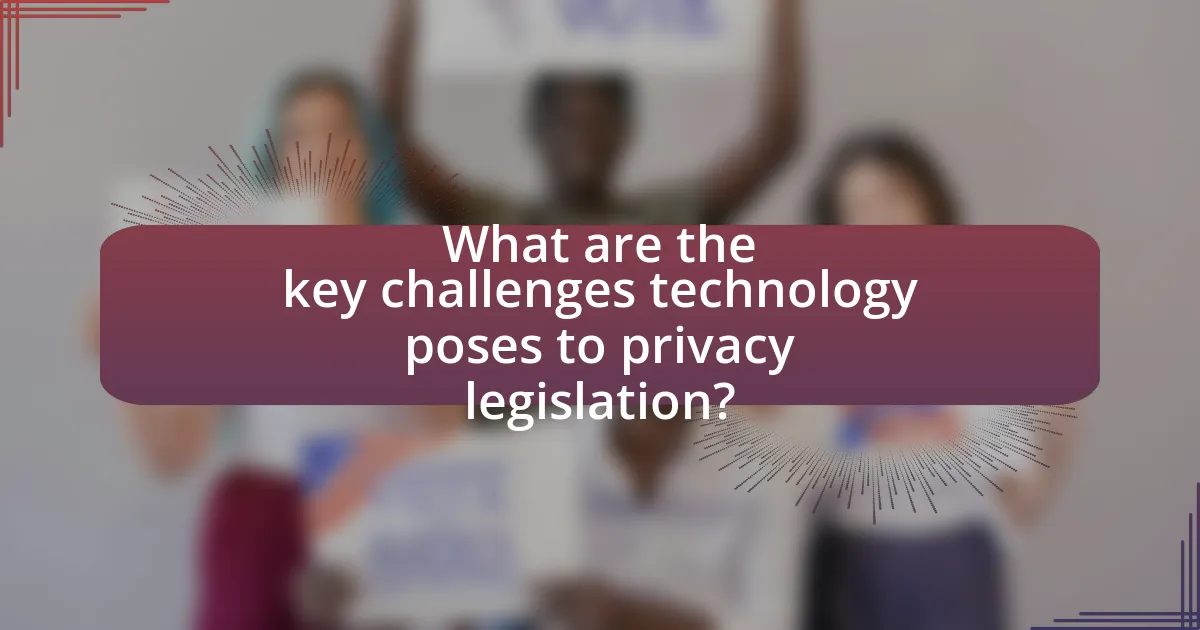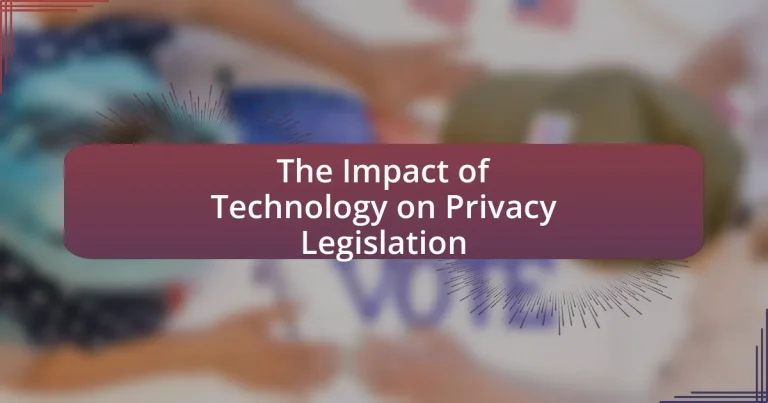The main entity of the article is the impact of technology on privacy legislation. The article examines how advancements in technology, particularly in areas such as artificial intelligence and big data analytics, necessitate updates to existing privacy laws to protect personal data. It discusses significant regulations like the General Data Protection Regulation (GDPR) and the California Consumer Privacy Act (CCPA), highlighting their roles in enhancing individual rights and addressing challenges posed by new data collection methods. Additionally, the article explores the implications of data breaches, the role of social media, and the evolving landscape of privacy legislation in response to technological advancements.

What is the Impact of Technology on Privacy Legislation?
Technology significantly influences privacy legislation by necessitating updates to laws that protect personal data. As digital communication and data collection methods evolve, existing privacy frameworks often become inadequate, prompting lawmakers to introduce new regulations. For instance, the General Data Protection Regulation (GDPR) implemented in the European Union in 2018 was a direct response to the rise of big data and online tracking technologies, aiming to enhance individuals’ control over their personal information. Additionally, advancements in artificial intelligence and data analytics have raised concerns about surveillance and data misuse, leading to calls for stricter privacy protections and transparency requirements in legislation.
How has technology evolved to influence privacy laws?
Technology has evolved significantly, leading to the development and modification of privacy laws to address new challenges. The rise of the internet, mobile devices, and data analytics has increased the volume of personal data collected, prompting lawmakers to create regulations such as the General Data Protection Regulation (GDPR) in Europe, which was enacted in 2018 to enhance data protection and privacy rights. Additionally, advancements in artificial intelligence and machine learning have raised concerns about surveillance and data misuse, influencing legislation like the California Consumer Privacy Act (CCPA) of 2018, which grants consumers greater control over their personal information. These examples illustrate how technological advancements necessitate ongoing adaptations in privacy laws to safeguard individual rights in an increasingly digital world.
What technological advancements have the most significant effects on privacy legislation?
Artificial intelligence and big data analytics have the most significant effects on privacy legislation. These technologies enable the collection, processing, and analysis of vast amounts of personal data, raising concerns about individual privacy rights. For instance, the implementation of the General Data Protection Regulation (GDPR) in the European Union was largely influenced by the need to address the challenges posed by these advancements, emphasizing the importance of consent and data protection. Additionally, the rise of surveillance technologies, such as facial recognition, has prompted lawmakers to reconsider existing privacy frameworks, leading to new regulations aimed at protecting citizens from potential abuses.
How do emerging technologies challenge existing privacy frameworks?
Emerging technologies challenge existing privacy frameworks by introducing new data collection methods and processing capabilities that outpace current regulations. For instance, advancements in artificial intelligence and machine learning enable the analysis of vast amounts of personal data in real-time, often without explicit consent from individuals. This capability undermines traditional privacy principles, such as notice and choice, which are foundational to many existing frameworks like the General Data Protection Regulation (GDPR). Additionally, technologies like the Internet of Things (IoT) create interconnected devices that continuously gather and share personal information, complicating the enforcement of privacy rights and accountability. As a result, existing privacy laws struggle to address the complexities and rapid evolution of these technologies, leading to gaps in protection for individuals.
Why is privacy legislation important in the digital age?
Privacy legislation is important in the digital age because it protects individuals’ personal information from unauthorized access and misuse. As technology advances, the volume of data collected by companies and governments increases, leading to heightened risks of data breaches and identity theft. For instance, the 2020 Verizon Data Breach Investigations Report revealed that 86% of breaches were financially motivated, underscoring the need for robust privacy laws to safeguard sensitive information. Furthermore, privacy legislation fosters consumer trust, encouraging individuals to engage with digital services without fear of exploitation. This trust is essential for the growth of the digital economy, as evidenced by the European Union’s General Data Protection Regulation (GDPR), which has set a global standard for data protection and privacy rights.
What are the key principles of privacy legislation?
The key principles of privacy legislation include data minimization, purpose limitation, consent, transparency, and accountability. Data minimization mandates that only necessary personal data should be collected and processed. Purpose limitation requires that data be collected for specific, legitimate purposes and not used beyond those purposes. Consent emphasizes that individuals must provide clear and informed agreement for their data to be processed. Transparency ensures that organizations inform individuals about how their data will be used. Accountability holds organizations responsible for complying with privacy laws and protecting personal data. These principles are foundational to frameworks such as the General Data Protection Regulation (GDPR), which aims to enhance individual privacy rights and establish strict guidelines for data handling.
How do privacy laws protect individuals in a technology-driven world?
Privacy laws protect individuals in a technology-driven world by establishing regulations that govern the collection, use, and sharing of personal data. These laws, such as the General Data Protection Regulation (GDPR) in Europe and the California Consumer Privacy Act (CCPA) in the United States, grant individuals rights over their personal information, including the right to access, correct, and delete their data. For instance, GDPR mandates that organizations must obtain explicit consent from individuals before processing their data, thereby enhancing individual control over personal information. Additionally, these laws impose penalties on organizations that fail to comply, which incentivizes businesses to prioritize data protection and privacy. This legal framework is essential in mitigating risks associated with data breaches and unauthorized data usage, ultimately fostering trust in digital interactions.

What are the key challenges technology poses to privacy legislation?
Technology poses significant challenges to privacy legislation primarily due to rapid advancements in data collection and processing capabilities. The proliferation of big data analytics enables organizations to gather vast amounts of personal information, often without explicit consent, complicating compliance with existing privacy laws. For instance, the General Data Protection Regulation (GDPR) in Europe mandates strict data handling practices, yet the dynamic nature of technology makes it difficult for legislators to keep pace. Additionally, the rise of artificial intelligence and machine learning introduces complexities in understanding how data is used and shared, leading to potential violations of privacy rights. Furthermore, cross-border data flows challenge jurisdictional enforcement of privacy laws, as data may be stored and processed in multiple countries with varying legal standards. These factors collectively hinder the effectiveness of privacy legislation in protecting individuals’ rights in an increasingly digital world.
How do data breaches impact privacy laws?
Data breaches significantly influence privacy laws by prompting legislative changes and stricter regulations to protect personal information. When high-profile data breaches occur, such as the Equifax breach in 2017, they expose vulnerabilities in existing laws and highlight the need for enhanced consumer protections. As a result, lawmakers often respond by enacting new regulations, like the California Consumer Privacy Act (CCPA), which was introduced in direct response to growing concerns over data security and privacy. These legislative actions aim to hold organizations accountable for safeguarding personal data and provide individuals with greater control over their information.
What are the consequences of data breaches for individuals and organizations?
Data breaches result in significant consequences for both individuals and organizations, including financial loss, reputational damage, and legal repercussions. For individuals, the exposure of personal information can lead to identity theft, financial fraud, and emotional distress. According to the Identity Theft Resource Center, in 2021, over 1,800 data breaches exposed more than 300 million records, highlighting the scale of risk individuals face.
Organizations suffer from direct financial costs related to breach response, regulatory fines, and potential lawsuits. The Ponemon Institute’s 2021 Cost of a Data Breach Report found that the average cost of a data breach for organizations was $4.24 million, emphasizing the financial impact. Additionally, organizations may experience long-term reputational harm, leading to loss of customer trust and decreased market share.
In summary, data breaches have profound implications, affecting personal security and organizational viability, supported by statistics that illustrate the widespread and costly nature of these incidents.
How have recent data breaches influenced legislative changes?
Recent data breaches have significantly influenced legislative changes by prompting governments to enact stricter data protection laws. For instance, the 2017 Equifax breach, which exposed the personal information of approximately 147 million individuals, led to the introduction of the Data Privacy Act in various jurisdictions, including California’s Consumer Privacy Act (CCPA) in 2018. This act established new consumer rights regarding personal data and imposed penalties for non-compliance, reflecting a direct response to the vulnerabilities highlighted by such breaches. Additionally, the European Union’s General Data Protection Regulation (GDPR), implemented in 2018, was also a reaction to increasing concerns over data security and privacy, emphasizing the need for organizations to adopt more robust data protection measures.
What role do social media and big data play in privacy concerns?
Social media and big data significantly contribute to privacy concerns by enabling the collection, analysis, and sharing of personal information without user consent. Social media platforms gather vast amounts of user data, including location, preferences, and interactions, which can be exploited for targeted advertising and surveillance. According to a 2020 report by the Pew Research Center, 79% of Americans expressed concern about how their data is collected and used by companies, highlighting the widespread apprehension regarding privacy. Furthermore, big data analytics allows organizations to process this information at scale, often leading to breaches of privacy and unauthorized access to sensitive data. The Cambridge Analytica scandal exemplifies this issue, where personal data from millions of Facebook users was harvested without consent for political advertising, raising significant ethical and legal questions about data privacy.
How does user-generated content affect privacy rights?
User-generated content significantly affects privacy rights by increasing the risk of personal information exposure. When individuals share content online, they often inadvertently disclose sensitive data, which can be harvested by third parties for various purposes, including targeted advertising and data profiling. According to a study by the Pew Research Center, 64% of Americans have experienced a major data breach, highlighting the vulnerability associated with sharing user-generated content. Furthermore, platforms hosting this content may not adequately protect user privacy, leading to potential violations of privacy laws such as the General Data Protection Regulation (GDPR) in Europe, which mandates strict guidelines on data handling and user consent.
What are the implications of big data analytics on personal privacy?
Big data analytics significantly impacts personal privacy by enabling the collection, analysis, and utilization of vast amounts of personal information without explicit consent. This capability raises concerns about data security, surveillance, and the potential for misuse of sensitive information. For instance, a report by the Electronic Frontier Foundation highlights that companies often aggregate data from various sources, leading to detailed profiles that can be used for targeted advertising or even discriminatory practices. Furthermore, the Cambridge Analytica scandal exemplifies how personal data can be exploited for political manipulation, underscoring the risks associated with inadequate privacy protections in the age of big data.

How are governments responding to the impact of technology on privacy legislation?
Governments are increasingly enacting and updating privacy legislation to address the challenges posed by technological advancements. For instance, the European Union implemented the General Data Protection Regulation (GDPR) in 2018, which sets strict guidelines for data protection and privacy for individuals within the EU and the European Economic Area. Similarly, the California Consumer Privacy Act (CCPA), effective from January 2020, grants California residents enhanced rights regarding their personal data. These legislative measures reflect a global trend where governments are recognizing the need to protect citizens’ privacy in an era of rapid technological change, as evidenced by the growing number of countries adopting or revising privacy laws to enhance data protection and user consent.
What new laws have been enacted to address technological advancements?
Recent laws enacted to address technological advancements include the California Consumer Privacy Act (CCPA) and the General Data Protection Regulation (GDPR) in the European Union. The CCPA, effective January 1, 2020, enhances privacy rights and consumer protection for residents of California, allowing individuals to know what personal data is collected and to whom it is sold. The GDPR, implemented on May 25, 2018, establishes strict guidelines for data protection and privacy for individuals within the EU, imposing significant penalties for non-compliance. Both laws reflect a growing recognition of the need to safeguard personal information in an increasingly digital world.
How do these laws vary across different countries?
Privacy laws vary significantly across different countries, influenced by cultural, legal, and technological factors. For instance, the European Union’s General Data Protection Regulation (GDPR) establishes stringent data protection standards, emphasizing individual consent and data subject rights, while the United States employs a more sector-specific approach, with laws like the California Consumer Privacy Act (CCPA) focusing on consumer rights without a comprehensive federal framework. Additionally, countries like China implement strict government control over data, prioritizing state security over individual privacy rights. These variations reflect differing national priorities regarding privacy, technology, and individual freedoms.
What are the challenges in enforcing these new privacy laws?
Enforcing new privacy laws faces significant challenges, primarily due to the rapid pace of technological advancement. Regulatory bodies often struggle to keep up with innovations such as artificial intelligence and big data analytics, which can outpace existing legal frameworks. Additionally, the complexity of data ecosystems, where data is shared across multiple platforms and jurisdictions, complicates enforcement efforts. For instance, the General Data Protection Regulation (GDPR) has faced difficulties in cross-border enforcement, as companies may operate in multiple countries with varying compliance requirements. Furthermore, there is often a lack of resources and expertise within regulatory agencies to effectively monitor and enforce compliance, leading to inconsistent application of the laws.
How are organizations adapting to comply with privacy legislation?
Organizations are adapting to comply with privacy legislation by implementing comprehensive data protection strategies and enhancing their data governance frameworks. Many organizations are investing in technology solutions such as data encryption, access controls, and privacy management software to ensure compliance with regulations like the General Data Protection Regulation (GDPR) and the California Consumer Privacy Act (CCPA). For instance, a survey by the International Association of Privacy Professionals (IAPP) found that 70% of organizations have increased their privacy budgets in response to evolving legislation. Additionally, organizations are conducting regular privacy impact assessments and employee training programs to foster a culture of compliance and awareness regarding data privacy issues.
What best practices should organizations implement to ensure compliance?
Organizations should implement a comprehensive compliance program that includes regular risk assessments, employee training, and robust data management policies. Regular risk assessments help identify vulnerabilities and ensure that organizations are aware of their compliance obligations under privacy legislation. Employee training is essential to ensure that all staff understand their roles in maintaining compliance and are aware of the latest regulations. Robust data management policies, including data encryption and access controls, protect sensitive information and align with legal requirements. According to a report by the International Association of Privacy Professionals, organizations with structured compliance programs are 50% more likely to avoid data breaches and associated penalties.
How can technology be leveraged to enhance privacy compliance?
Technology can be leveraged to enhance privacy compliance through the implementation of automated data management systems that ensure adherence to regulations. These systems can track data usage, manage consent, and facilitate data subject rights, such as access and deletion requests, in real-time. For instance, tools like Data Loss Prevention (DLP) software can monitor and protect sensitive information, while encryption technologies safeguard data both in transit and at rest. According to a 2021 report by the International Association of Privacy Professionals, organizations utilizing automated compliance solutions experienced a 30% reduction in compliance-related incidents, demonstrating the effectiveness of technology in maintaining privacy standards.
What are the future trends in privacy legislation influenced by technology?
Future trends in privacy legislation influenced by technology include the implementation of stricter data protection laws, increased regulation of artificial intelligence, and enhanced consumer rights regarding data access and deletion. As technology evolves, particularly with advancements in AI and data analytics, lawmakers are responding by enacting comprehensive regulations like the General Data Protection Regulation (GDPR) in Europe, which sets a precedent for similar laws globally. Additionally, the rise of biometric data usage is prompting legislation that specifically addresses the collection and storage of such sensitive information, ensuring that individuals have greater control over their personal data. These trends reflect a growing recognition of the need to balance technological innovation with the protection of individual privacy rights.
How might artificial intelligence shape future privacy laws?
Artificial intelligence will likely shape future privacy laws by necessitating more stringent regulations to protect personal data. As AI systems increasingly analyze vast amounts of personal information, the potential for misuse and breaches of privacy rises, prompting lawmakers to establish clearer guidelines on data collection, consent, and user rights. For instance, the General Data Protection Regulation (GDPR) in Europe has already set a precedent by requiring explicit consent for data processing, a trend that may expand as AI technologies evolve. Furthermore, AI’s ability to create detailed user profiles could lead to laws that mandate transparency in how data is used and the algorithms that drive decision-making processes, ensuring individuals have greater control over their personal information.
What role will consumer awareness play in the evolution of privacy legislation?
Consumer awareness will significantly influence the evolution of privacy legislation by driving demand for stronger protections and transparency regarding personal data usage. As consumers become more informed about data privacy issues, they are more likely to advocate for legislative changes that hold companies accountable for data breaches and misuse. For instance, the implementation of the General Data Protection Regulation (GDPR) in the European Union was largely a response to heightened consumer awareness and concern over data privacy, leading to stricter regulations on how organizations handle personal information. This trend indicates that as consumer awareness grows, lawmakers are compelled to respond with more robust privacy laws to meet public expectations and protect individual rights.
What practical steps can individuals take to protect their privacy in a tech-driven world?
Individuals can protect their privacy in a tech-driven world by implementing strong password management, utilizing encryption tools, and being cautious with personal information sharing. Strong password management involves using unique, complex passwords for different accounts and employing password managers to store them securely. Encryption tools, such as VPNs and encrypted messaging apps, safeguard data during transmission, making it difficult for unauthorized parties to access sensitive information. Additionally, individuals should limit the amount of personal information shared on social media and review privacy settings on platforms to control who can see their data. According to a 2021 study by the Pew Research Center, 81% of Americans feel they have little to no control over the data collected about them, highlighting the importance of proactive measures in privacy protection.





